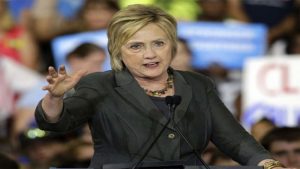 WASHINGTON — The F.B.I. director, James B. Comey, said on Tuesday that the bureau would not recommend criminal charges in Hillary Clinton’s handling of classified information, lifting an enormous legal cloud from her presidential campaign, hours before her first joint campaign appearance with President Obama.
WASHINGTON — The F.B.I. director, James B. Comey, said on Tuesday that the bureau would not recommend criminal charges in Hillary Clinton’s handling of classified information, lifting an enormous legal cloud from her presidential campaign, hours before her first joint campaign appearance with President Obama.
But Mr. Comey rebuked Mrs. Clinton as being “extremely careless” in using a personal email address and server for sensitive information, declaring that an ordinary government official could have faced administrative sanction for such conduct.
To warrant a criminal charge, Mr. Comey said, there had to be evidence that Mrs. Clinton intentionally sent or received classified information — something that the F.B.I. did not find. “Our judgment is that no reasonable prosecutor would bring such a case,” he said at a news conference.
The Justice Department is highly likely to accept the F.B.I.’s instruction. Attorney General Loretta Lynch said on Friday that she would accept the recommendation of the F.B.I. and career prosecutors in the case, after questions were raised about an impromptu meeting between her and former President Bill Clinton at an airport in Phoenix.
Mr. Comey’s statement came three days after F.B.I. investigators interviewed Mrs. Clinton, a sign that the case was winding down. He described an elaborate yearlong investigation, in which the F.B.I. examined multiple servers, read 30,000 emails and interviewed dozens of people.During the investigation, Mr. Comey said, the F.B.I.
recovered additional work-related emails that Mrs. Clinton’s lawyers had not turned over to the State Department, including some that contained classified information. But he said there was no evidence that she or her lawyers had intentionally deleted or withheld them.
Still, Mr. Comey delivered what amounted to an extraordinary public tongue-lashing. “There is evidence to support a conclusion,” he said, that Mrs. Clinton “should have known that an unclassified system was no place for that conversation.”
The news conference by Mr. Comey concluded an investigation that began a year ago when the inspector general for the intelligence agencies told the Justice Department that he had found classified information among a small sampling of emails Mrs. Clinton had sent and received.
The inspector general, I. Charles McCullough III, said that the emails contained information that was classified at the time they were sent but were not marked classified, and that the information should never have been sent on an unclassified system.
The discovery of Mrs. Clinton’s email practices grew out of a request by the House Select Committee on Benghazi for communications between Mrs. Clinton and other officials surrounding the September 2012 attack on the diplomatic outpost in Benghazi, Libya, that killed four Americans, including Ambassador J. Christopher Stevens.
As lawyers for the State Department gathered materials, they discovered that Mrs. Clinton had used a personal, nongovernment address for her email and routed the messages through a server, kept in her home in Chappaqua, N.Y.
After a negotiation between the State Department and Mrs. Clinton’s lawyers, she agreed to turn over 55,000 pages of email from her time as secretary of state. She withheld email — roughly half the total number of messages — that she said touched on personal issues, from yoga classes to the flower arrangements for her daughter’s wedding.
The State Department turned over to the House committee roughly 800 emails pertaining to Benghazi. Mrs. Clinton asked the department to release the remaining trove of emails, which set off a complicated, politically charged process of vetting each one to determine whether it contained classified information.
The C.I.A., the State Department and other agencies reviewed the emails, designating hundreds of them with varying levels of classification.Mrs. Clinton has asserted that she did not send or receive any information marked classified at the time it was sent. But about two dozen emails were designated “top secret,” the highest level of classification, and Mrs. Clinton’s critics say she jeopardized national security.
Several of those pertained to the C.I.A.’s drone program in Pakistan, which is a covert program, though it is widely reported in the Pakistani and American news media.
